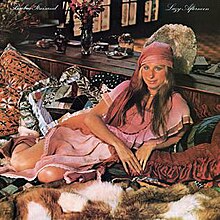
"The Way We Were" is a song by American singer Barbra Streisand from her fifteenth studio album of the same name. It was released as the album's lead single on September 27, 1973, through Columbia Records. The 7" single was distributed in two different formats, with the standard edition featuring B-side track "What Are You Doing the Rest of Your Life?"; the Mexico release instead included an instrumental B-side. The song was written by Alan Bergman, Marilyn Bergman, and Marvin Hamlisch, while production was solely handled by Marty Paich. "The Way We Were" was specifically produced for the record, in addition to three other tracks, including her then-upcoming single "All in Love Is Fair" (1974).
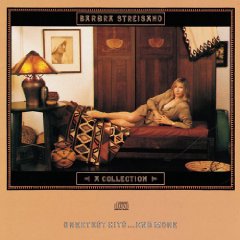
A Collection: Greatest Hits...and More is the fourth greatest hits album recorded by American vocalist Barbra Streisand. It was released on October 3, 1989 by Columbia Records. The compilation features ten songs from Streisand's career, dating from 1975 to 1988, plus two previously unreleased songs: "We're Not Makin' Love Anymore" was released as the album's lead single on September 14, 1989, and "Someone That I Used to Love" was distributed as the second and final one in 1989. Both singles charted on several record charts internationally.

Duets is a compilation album by American singer Barbra Streisand, released on November 26, 2002, by Columbia Records. The collection features nineteen duets from Streisand's career, including two newly recorded ones: "I Won't Be the One to Let Go" with Barry Manilow and "All I Know of Love" with Josh Groban. The Manilow duet was released as the album's lead single on November 4, 2002, as a streaming-only exclusive for AOL Music website members.

"Shake Me, Wake Me " is a song recorded by the American quartet Four Tops for their third studio album, On Top (1966). It was released in February 1966 as a 7" vinyl single through Motown records. It was written and produced by Brian Holland, Lamont Dozier, and Eddie Holland. A gospel rock track, its lyrics detail a relationship that has ended. It has since been regarded as one of Four Tops' most successful singles ever. It charted moderately well in both the United States and Canada, and became the group's fifth consecutive entry to chart within the top five of the Hot R&B/Hip-Hop Songs chart. Four Tops has performed "Shake Me, Wake Me " on various occasions throughout their careers and have included it on several greatest hits albums, including on The Four Tops Greatest Hits (1967) and The Ultimate Collection (1997).
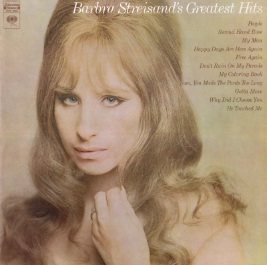
Barbra Streisand's Greatest Hits is the first greatest hits album recorded by American vocalist Barbra Streisand. It was released in January 1970, by Columbia Records. The record is a compilation consisting of 11 commercially successful singles from the singer's releases in the 1960s, with a majority of them being cover songs. The songs on Barbra Streisand's Greatest Hits originally appeared on one of the singer's eight previous albums and span in release from 1963 to 1968. It contains her most commercially successful tracks, including her first Billboard Hot 100 top ten single "People" and top 40 entry "Second Hand Rose". The album was distributed on compact disc in 1986 and rereleased under the title The Hits in 2006.
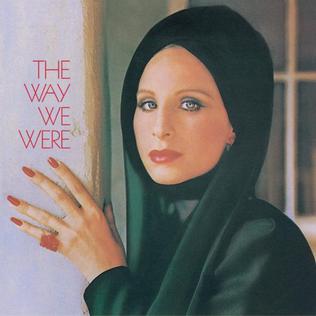
The Way We Were is the fifteenth studio album recorded by American singer Barbra Streisand. The album was released in January 1974, preceded by the commercial success of its lead single "The Way We Were" first released in September 1973.

Barbra Streisand's Greatest Hits Volume 2 is the second greatest hits album recorded by American vocalist Barbra Streisand. It was released on November 15, 1978 by Columbia Records. The album is a compilation consisting of ten commercially successful singles from the singer's releases in the 1970s, with a majority of them being cover songs. It also features a new version of "You Don't Bring Me Flowers", which was released as the collection's only single on October 7, 1978. Originating on Streisand's previous album, Songbird, the new rendition is a duet with Neil Diamond who had also recorded the song for his 1978 album of the same name. The idea for the duet originated from DJ Gary Guthrie who sold the idea to the record label for $5 million.
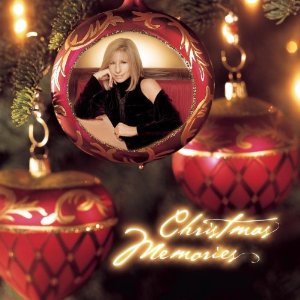
Christmas Memories is the second Christmas album and twenty-ninth studio release by American singer Barbra Streisand. It was released on October 30, 2001, by Columbia. Streisand recorded the album during July, August, and September 2001 in various recording studios throughout California and in North Vancouver. It was executive-produced by Streisand and Jay Landers, while William Ross and David Foster served as additional producers. The album contains several cover versions of various holiday songs. To promote Christmas Memories, Columbia Records released an advance sampler version of the album titled A Voice for All Seasons.
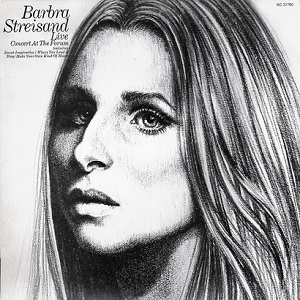
Live Concert at the Forum is the second live album by American singer Barbra Streisand, released physically on October 1, 1972, by Columbia Records. Produced by long-time collaborator Richard Perry, it was recorded at The Forum in Inglewood, part of Greater Los Angeles, on April 15, 1972, during Four for McGovern, a concert held in benefit for George McGovern's 1972 presidential campaign. A CD version of Live Concert at the Forum was released on September 6, 1989.

ButterFly is the sixteenth studio album by American singer Barbra Streisand. Released on October 1, 1974, by Columbia Records, it marked Streisand's first album of entirely new material in over three years. Primarily a contemporary pop record recorded throughout 1974, it also incorporates music from the reggae and R&B genres. All of the tracks on ButterFly are cover songs produced by Streisand's then-boyfriend Jon Peters, originating from artists like Bob Marley, David Bowie, Evie Sands, and Graham Nash.

Barbra Streisand...and Other Musical Instruments is the fourteenth studio album by American singer Barbra Streisand. It was released on November 2, 1973, by Columbia Records. The album was made available following a 1973 live television special promoted to improve Streisand's image and sound. With world music as the primary genre, the album's instrumentation varies greatly; even items such as kitchen utensils were used to create melodies and beats. With a majority of the songs on the album being cover songs, Streisand also re-recorded various tracks that originated earlier in her career. Her manager, Martin Erlichman, was credited as the album's sole and executive producer.

"Didn't We" is a song recorded by Irish singer and actor Richard Harris for his debut studio album, A Tramp Shining (1968). It was written and produced by Jimmy Webb and originally served as the B-side to Harris' 1968 single "MacArthur Park". "Didn't We" was then distributed as the record's single by Dunhill Records, also in 1968. A traditional pop song, Harris sings about his life in the past. Commercially, it charted at lower positions of both the United States and Canada, and in the higher ranks of their Adult Contemporary component charts. Harris featured "Didn't We" on several of his greatest hits albums, including The Richard Harris Collection: His Greatest Performances from 1973. That same year, the song was reissued as a promotional single paired alongside his 1971 single "My Boy".

"Guava Jelly" is a song recorded by the Jamaican group Bob Marley and the Wailers. It was released as a 7" vinyl single through Tuff Gong and Green Door Records. It was issued commercially with B-side track "Redder Then Red", which was misspelled on its initial printing, in 1971. It was written and produced by Marley and features uncredited lyrical contributions from Bunny Livingston. A reggae composition like the majority of Marley's works, "Guava Jelly" contains a rocksteady and island-like production with lyrics loosely based around sexual intercourse. His use of the term "guava jelly" was likely referring to a specific type of sexual lubricant. It was favorably viewed by several reviewers, with many of them finding the composition to be sexual and about love. The group placed "Guava Jelly" on several compilation albums, including Africa Unite: The Singles Collection in 2005, and Owen Gray and Herbie Mann created their own versions in 1974 and 1975, respectively.

"All in Love Is Fair" is a song by American singer-songwriter Stevie Wonder recorded for his sixteenth studio album, Innervisions (1973). Written and produced by Wonder, it was released as a 7" single in Brazil in 1974. The song is a pop ballad with lyrics that describe the end of a relationship through the use of clichés. Critical reaction to the song has been varied: Matthew Greenwald of AllMusic wrote that it was among Wonder's "finest ballad statements", but Robert Christgau felt that the singer's performance was "immature". Wonder has included it on several of his greatest hits albums, including the most recent, 2005's The Complete Stevie Wonder.

"Jubilation" is a song recorded by Canadian singer-songwriter Paul Anka for his 1972 studio album of the same name. Anka wrote the song with Johnny Harris, who also produced the track. It was released in 1972 as a 7" single by Buddah Records. A gospel song, the lyrics of "Jubilation" find the protagonist preaching about religious themes. Making a moderate commercial impact, it appeared on the record charts in both Canada and the United States. It has since been included on several of Anka's greatest hits albums and covered by The Edwin Hawkins Singers in 1973.
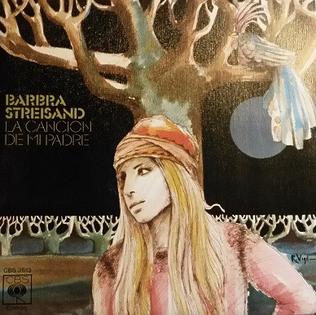
"My Father's Song" is a song recorded by American singer Barbra Streisand for her seventeenth studio album, Lazy Afternoon (1975). It was released as a 7" single in August 1975 through Columbia Records. Rupert Holmes wrote the song in collaboration with its producer Jeffrey Lesser. A sentimental ballad, "My Father's Song" was about Streisand's childhood with her father; Holmes' lyrics involve a protagonist, presumably a daughter, asking for her father's approval in life and love.

"How Lucky Can You Get" is a song recorded by American vocalist Barbra Streisand for the official soundtrack to the 1975 film Funny Lady. It was released as a 7" single in April 1975 through Arista Records. The song was written by Fred Ebb and John Kander, while production was handled by Peter Matz. "How Lucky Can You Get" is one of the new songs on the soundtrack, with its origins coming from Fanny Brice, the character Streisand portrays in the aforementioned film. The music pertains to Brice herself, particularly the sarcastic nature of the lyrics that are accompanied by an "insistent" melody and production. It was suggested that the pattern of the lyrics may have been influenced by Giacomo Puccini's 1896 opera, La bohème.

"Stranger in a Strange Land" is a song recorded by American singer Barbra Streisand for her 31st studio album, Guilty Pleasures (2005). It was released as the album's lead single on August 16, 2005, by Columbia Records. The track was written by Ashley Gibb, Barry Gibb and Stephen Gibb while production was handled by Barry Gibb and John Merchant. It serves as the first of 11 reunion collaborations with Barry Gibb, who Streisand had last collaborated with on Guilty (1980). The single was released digitally and physically distributed on CD and DVD, with some editions including the song's official music video.

"Night of My Life" is a song recorded by American singer Barbra Streisand for her 31st studio album, Guilty Pleasures (2005). It was released as the album's second single on September 27, 2005, by Columbia Records. The track was written by Ashley Gibb and Barry Gibb while production was handled by Barry Gibb and John Merchant. It serves as one of Streisand's first of 11 reunion collaborations with Barry Gibb since their work on her album Guilty in 1980. It was released digitally and on 12" and CD in five different formats, each including various remixes of the single.

Funny Lady is the soundtrack album of the 1975 musical film of the same title, starring Barbra Streisand. Released by Arista Records on March 15, 1975, arranged, conducted, and coordinated by Peter Matz, the album's fifteen tracks are performed by Streisand, James Caan, and Ben Vereen. A sequel to the 1968 musical comedy-drama Funny Girl, the songs extend the semi-biographical account of the life of American performer Fanny Brice. Funny Lady also included songs written by Brice's third husband Billy Rose. New music by Kander and Ebb included "How Lucky Can You Get", the album's only single, released in April 1975.
